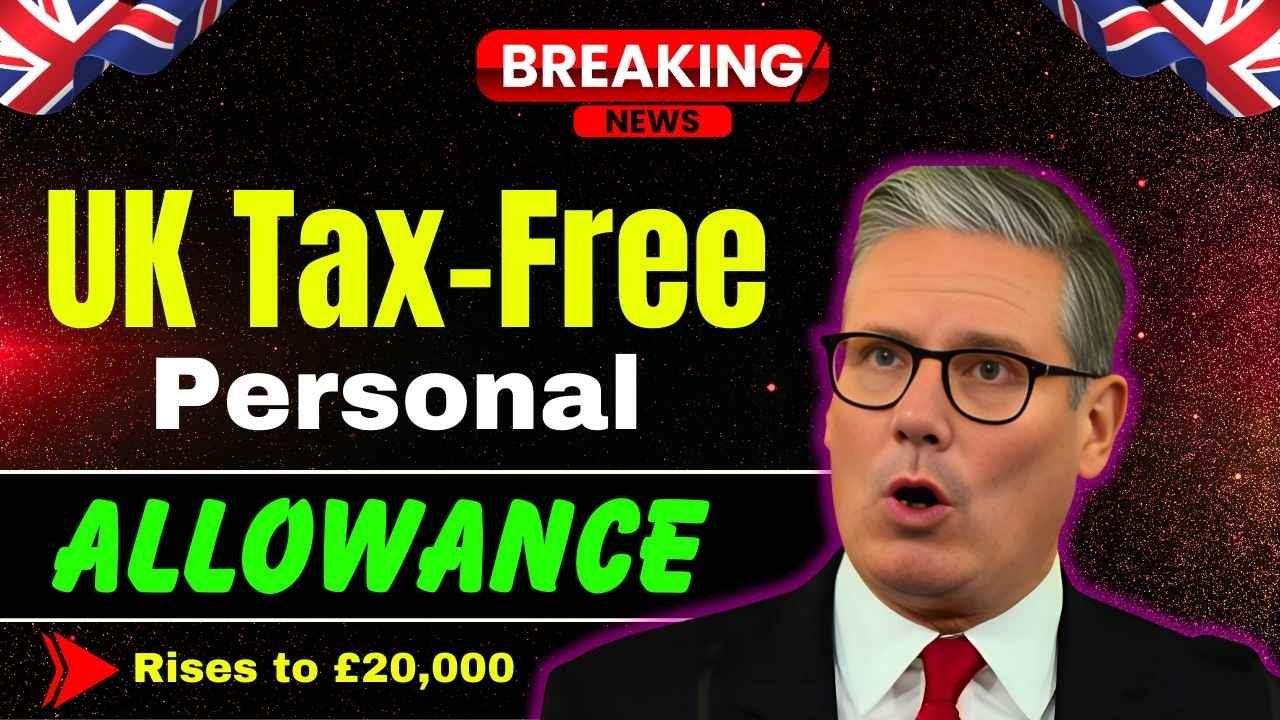Join on WhatsApp
Get the latest updates directly on WhatsApp – motivation, news & more!
In a major shift to ease the cost of living burden, the UK government has confirmed that the personal tax-free allowance will increase to £20,000 from April 2025. This is a significant rise from the current threshold of £12,570 and is being described as one of the most generous tax changes in recent years.
The move is expected to put more money back into the pockets of millions of workers, pensioners, and low-income earners across the country. But how much will you really save? Who gains the most from this change? And are there any hidden impacts you should know about?
This guide explains everything in simple terms.
What Is the Personal Allowance?
The personal allowance is the amount of income you can earn each year before you have to start paying income tax. For example, if the personal allowance is £12,570 and you earn £20,000 a year, you only pay tax on the £7,430 above the threshold.
From April 2025, the personal allowance will rise to £20,000. This means that you will not pay any income tax unless you earn more than that amount annually.
Why Is the Personal Allowance Increasing?
The decision to raise the personal allowance is largely driven by two factors:
- The rising cost of living, including food, energy, and housing
- The government’s aim to boost disposable income, especially for working households
For years, the allowance had been frozen at £12,570, and as wages gradually increased, more people ended up paying tax. This created a situation called “fiscal drag”, where people pay more tax without actually being better off in real terms. By raising the allowance, the government aims to reverse some of that impact.
Who Benefits the Most?
This change affects nearly everyone who pays income tax, but some groups will feel the benefit more than others.
Full-time workers
If you’re employed and earning over £20,000, you’ll save the full benefit of this change. Your first £20,000 will now be tax-free, saving you hundreds of pounds a year.
Part-time workers
Those earning between £12,570 and £20,000 will also benefit, as a larger portion of their income will now fall below the tax threshold.
Pensioners
Many pensioners receive income through the State Pension and private pensions. With the new allowance, most will see a reduction in how much tax is taken from their pension payments.
Self-employed individuals
Sole traders and small business owners who file Self Assessment returns will benefit too. The new allowance will reduce their taxable income, helping to offset rising costs.
Low-income households
People working part-time or earning near the minimum wage may now fall completely outside the tax system, depending on their total income.
How Much Will You Save?
The exact amount you save depends on how much you earn. Here’s a simple breakdown:
- If you earn £20,000: You’ll save around £1,486 compared to the old threshold
- If you earn £25,000: You’ll save around £1,486, as only income over £20,000 is taxed
- If you earn £30,000: You still save £1,486, but pay tax on the £10,000 above the threshold
This assumes a basic 20% income tax rate and no other adjustments like marriage allowance or tax code changes.
Will National Insurance Change Too?
As of now, the National Insurance thresholds are separate from income tax. The government has not confirmed any changes to NI thresholds alongside the personal allowance increase.
This means you may still pay National Insurance contributions on income above £12,570, even though your income tax only kicks in at £20,000.
Still, the overall savings on income tax will make a noticeable difference in your take-home pay.
Are There Any Downsides?
While the increase in personal allowance is mostly positive, there are a few things to consider:
- Higher earners may not see a large impact since they pay tax at 40% on income above £50,270
- It could lead to reduced benefit eligibility for some people, as higher take-home income can affect means-tested support
- Public sector workers may not see large gains if their wages remain frozen
Also, funding a large tax cut means the government will collect less revenue, which could affect spending on public services in the long term.
How Will It Affect PAYE Workers?
If you’re on Pay As You Earn (PAYE), your employer will automatically adjust your tax code from April 2025. This means:
- You don’t need to apply or fill out forms
- Your take-home pay will increase without any action from you
- You’ll see the difference reflected in your April 2025 payslip
If you think your tax code is incorrect after the change, you should contact HMRC to have it reviewed.
What About Students and Apprentices?
Students who work part-time will benefit too. If you earn under £20,000 during the tax year, you won’t pay any income tax at all. This is especially helpful for university students juggling studies and part-time jobs.
Apprentices earning entry-level wages will likely fall entirely below the new threshold, keeping more of what they earn each month.
What Happens If You’re on Benefits?
For those receiving Universal Credit or other means-tested benefits, a rise in take-home pay could affect entitlement. The DWP uses net income to calculate benefit levels, so any extra income from tax savings might slightly reduce your award.
That said, the overall gain from lower tax will usually outweigh any small reduction in benefits.
Final Thoughts
The increase of the UK personal allowance to £20,000 in 2025 is a major step toward helping working people and pensioners keep more of their income. At a time when living costs remain high, this change offers real financial relief for millions.
Whether you’re working full-time, part-time, self-employed, or retired, the extra savings could help cover essentials, reduce debt, or simply provide more breathing room in your monthly budget.
Keep an eye on your pay in April 2025, and make sure your tax code is correct. For most people, this change will be automatic but its impact will be felt in every payslip from that point forward.



